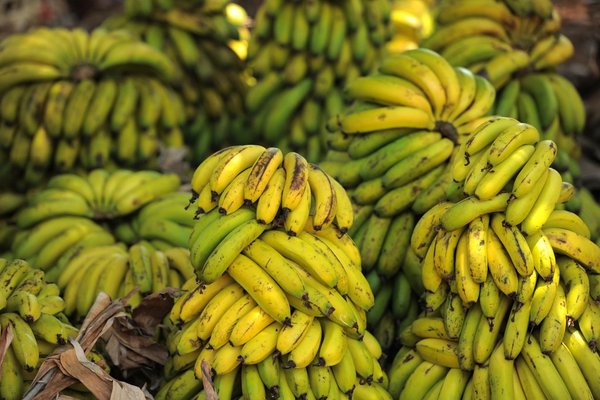- Share this article
- Subscribe to our newsletter
Enhancing efforts to protect bananas
An emergency project to help countries in Latin America and the Caribbean fight the spread of Fusarium wilt disease was launched in early October 2019 by the Technical Cooperation Programme of the Food and Agriculture Organization of the United Nations (FAO). At the same time, the International Atomic Energy Agency (IAEA) reports that after years of research, Chinese experts have recently released a new variety resistant to TR4 of Cavendish.
Fusarium wilt disease - caused by the most recent strain (Tropical Race 4, TR4) of the fungus Fusarium oxysporum f.sp. cubense - affects the production of many varieties of plantains and bananas, including Cavendish, one of the globally most popular varieties in the market. Cavendish banana variety makes up around 47 per cent of global production. TR4 damages the roots and stems of the plant and, while not harmful to human health, can lead to 100 per cent yield losses.
New emergency project assists countries in the fight against TR4
TR4 was recently detected for the first time in Latin America and the Caribbean in Colombia, where 175 hectares of banana farms have now been put under quarantine by the Instituto Colombiano Agropecuario (ICA). Nearby Ecuador is the world's largest banana exporter, while Colombia, Costa Rica, and Guatemala are also major producers. If the disease spreads, it would have devastating impacts for farmers and their families across the region.
The emergency project will assist countries in developing regional and national action plans, increasing their capacities to prevent, diagnose, monitor and contain outbreaks, and raise awareness and disseminate information among farming communities, according to FAO. In addition, the new TR4 wilt project for Latin America and the Caribbean also aims to support greater collaboration and experience-sharing among the countries in the region.
These activities will be conducted under the leadership of national governments, in a coordinated effort with relevant phytosanitary institutions, including national and regional plant protection organizations (CAHFSA, CAN, COSAVE, OIRSA) as well as the International Plant Protection Convention (IPPC) Secretariat.
Chinese researchers develop a new variety resistant to TR4
IAEA, in cooperation with FAO, has worked with researchers from all around the world to support the development of new varieties of various banana species that would be resistant to the disease. Since modern bananas cannot grow seeds, improving through cross breeding is difficult, they say. Therefore, the use of techniques such as irradiation or chemical mutagenesis to produce new varieties with favourable traits is often a favoured option to combat the disease.
As IAEA reported, Chinese experts have recently released a new variety resistant to TR4 of Cavendish. It was developed using chemical mutagenesis techniques. Other countries, including the Philippines, are in advanced stages of developing their own varieties using gamma irradiation, according to researchers from IAEA. The new ‘local’ banana variety resistant to Fusarium Wilt TR4 has been successfully tested the new plants in field trials. It is now being multiplied and distributed to other provinces.
FAO estimates that the annual direct damage caused by TR4 in Southeast Asia values about USD 400 million, excluding indirect socio-economic impacts.
(FAO/IAEA/ile)
More information:
FAO Website: www.fao.org/news/story/en/item/1235747/icode/
IAEA Website: www.iaea.org/newscenter/news/iaea-fao-help-develop-bananas-resistant-to-major-fungal-disease





Add a comment
Be the First to Comment